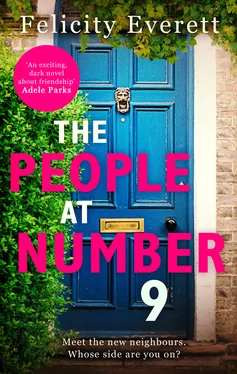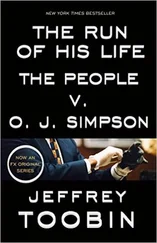“Thanks,” said Lou, honking noisily into the paper handkerchief. She met Sara’s eye with a brave smile.
“Well,” said Sara briskly, after a brief silence, “I for one am grateful to them.”
Lou looked puzzled.
“To the Fernandezes, or whatever they’re called. If it wasn’t for them and their stupid trout, you wouldn’t be here now, would you? We wouldn’t have you as neighbours.”
“ Oh! ” Lou gave her a tremulous smile.
The doorbell rang and Sara glanced at the clock.
“Shit!” she said. “Guitar.”
And with that, the spell was broken. Lou was a neighbour she hardly knew, the kitchen looked like a bomb had hit it and Caleb hadn’t practised Cavatina all week. She flew down the hall and let the guitar teacher in, noticing, even as she burbled apologetically to him about the chaos, the flicker of interest he betrayed as he passed Lou in the hall. It was the kind of glance Sara herself never elicited – not sexual exactly, though there was that in it – more a look of recognition. You are of my kind, the look said, or of the kind to which I aspire. And whilst appearing oblivious, Lou nevertheless managed both to acknowledge his need and to remain aloof from it. Sara felt a pang of envy.
Standing on the doorstep, Lou and Sara both started speaking at once.
“I can’t tell you how…”
“I’m really glad you…”
They laughed and Sara deferred to Lou, who shrugged as if suddenly lost for words.
“ Thank you ,” she said, finally, and they both laughed with relief. Lou had got as far as the garden gate, when she turned back, as if a rash new idea had occurred to her.
“We’re having a few people over on Saturday, a little get-together to christen the house. Why don’t you come?”
2
By the time they had settled the boys and let themselves out of the front door, the street lamps were turning from nascent pink to sodium orange. The Victorian semis loomed tall and narrow in the navy dusk, like nuns having a conflab. The dead hand of gentrification had not yet touched all of them. For every topiaried bay tree, there was a satellite dish, for every tasteful leaded light, a PVC porch. Gav and Lou’s place had yet to declare itself. The skip at the front provided some intriguing clues – an ugly fifties fire surround, a naked shop mannequin – but it was too soon to say for sure what kind of people these were.
“Bloody hell!” hissed Neil, as they stood on Gav and Lou’s doorstep, waiting in vain for someone to hear the bell. “What did you want to bring the Moët for?”
Sara shrugged.
“It’s all we had left.”
She had made a point of opening the last bottle of Sainsbury’s Soave, earlier in the evening, partly to settle her nerves, but mainly to make sure the Moët was all they had left. She knew, if she were honest, that Neil had tucked it at the back of the fridge on the off-chance he might soon have something to celebrate. He was plotting a boardroom coup in the housing association where he worked and he was pretty sure, he had told her over dinner the other night, his grey eyes animated, his jaw churning salad like a cement mixer, that he now had enough people onside to oust the finance director. This would remove the final obstacle between him and the CEO’s job he had long coveted. Sara had looked at him and seen little trace of the humble, idealistic undergraduate with whom she had fallen in love.
If she had told him, back then, that he would be buying Moët to toast his ascendancy to a boardroom, any boardroom, he would have called her a fantasist. Yet here he was, looking every inch the smart casual capitalist in his Paul Smith shirt and Camper shoes. He still had a plausible shtick on why his running Haven Housing would be the tenant-friendly outcome, but it seemed to her that the tenant-friendly outcome was inseparable these days from the Neil-friendly outcome. He had started at Haven wearing jeans and button-down shirts. Gradually, the jeans had gone and a tie had crept in (“tenants like a tie”, he’d said). A brief spell of chinos and sleeveless pullovers had given way to the era of the suit. Suits went down better with “stakeholders”, whoever they were. Scratch the suave surface, though, and you’d find the idealist beneath, still fighting the good fight, still standing up for the underdog. He wasn’t a cynic, her Neil.
She pushed the door, tentatively, and it opened.
“I think we’re just meant to go in,” she said.
It was still unclear whether the event was a soirée or a rave. All day she had kept her ear cocked and her eyes open, but there hadn’t been much to go on. The household had seemed to slumber until well after two, which, for a young family on a summer’s weekend, struck Sara as a significant feat. Then, when most people were beginning to wind down, they suddenly sprang into action. From her vantage point at the kitchen window, she could see Gavin hacking branches off the lime trees at the bottom of the garden with what must have been a blunt saw, because his torso was running with sweat. The temperature had to be in the mid-twenties, and, as it had seemed the whole of that summer, the humidity was high. Their fence was too tall and their shrubs too unkempt to afford anything but the odd glimpse of the kids, but she could hear their excited shrieks and yelps. Music blasted through the open windows – something kitschy and seventies, Supertramp maybe – but, occasionally, Lou would kill the volume and Sara would hear her call out, her tone plaintive, yet with a stridency that somehow managed to penetrate the rasp of the saw.
“Ga- a -av?”
When he had stopped and turned towards her, face glowing, chest heaving, she would ask him some trivial question or other, more to prove her entitlement to do so, it seemed to Sara, than because she really needed to know the answer.
By six o’clock, he was still perched in a cleft of the third and final tree, sawing at a stubborn shred of bark tethering the last substantial branch to its trunk. If it were Neil up the tree, and the two of them were having a “get-together” that night, however impromptu, she knew she’d have been going spare.
She had dithered about a babysitter, and in the end done nothing, because she didn’t really know what the deal was. She’d decided she’d just keep an eye out and when enough guests had arrived, they’d wander round. There was the problem of what to wear, but seeing the way their hosts had gone about things, she reckoned it had to be pretty relaxed. By eight, she was showered, and semi-got-up in her For All Mankind jeans, a silk camisole and strappy sandals, which she’d changed for Birkenstocks, as soon as she saw the look on Neil’s face. She could, she knew, have stared at his Coldplay T-shirt until it burst into flames and he still wouldn’t have got the hint, so in the end she’d just told him as nicely as she could to change it.
The hall was deserted. Tea lights on every step of the uncarpeted stairs threw juddering shadows up the wall.
“Place could go up like a tinderbox,” muttered Neil. The throb of seriously amplified music came from deep within the house. Closer at hand, the hum of party chatter made Sara’s stomach clench with anxiety. She poked her head around the door of the living room; a bearded man in a rumpled linen suit was sitting on a Scandinavian-style leather sofa rolling a joint on an album cover as if it were 1979. What she could see of the room was an odd combination of mess and emptiness. The walls were hung haphazardly with artworks. One alcove was crammed from floor to ceiling with books. In the other, a hydra-headed chrome floorlamp loomed behind a beaten-up Eames chair. Fairy lights were strung through the antlers of a stuffed stag’s head above the fireplace. There was a smell of curry and pot and a faint mustiness, which suggested that the age-old damp problem that had long beset the house had not necessarily been cured. In another corner of the room, she now picked out, amid the gloom, a man in a pork-pie hat and a woman in Rockabilly get-up. They were clutching cans of Red Stripe. She smiled at them tentatively and ducked back out again. She shrugged at Neil.
Читать дальше












